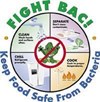Do you remember your Grandmother telling you to “get your beauty rest”? Or Ben Franklin’s saying “Early to bed and early to rise makes a man healthy, wealthy and wise.”? It might turn out that they were a lot closer to the truth than we ever gave them credit for. Every couple of months recently there has been another report of some study showing that not getting enough sleep could be making us fat!
Posted 9/16/2014 by Mary Keith, Hillsborough County Extension, Florida

Posted 9/16/2014 by LSU AgCenter

High blood pressure is dangerous because it makes the heart work too hard and contributes to atherosclerosis (hardening of the arteries) says LSU AgCenter nutritionist Dr. Beth Reames.
Uncontrolled high blood pressure can lead to heart disease, stroke and kidney disease. These are the first, third and ninth leading causes of death in the United States. High blood pressure can result in other conditions, such as congestive heart failure and blindness.
Posted 9/13/2014 by www.choosemyplate.gov

A critical part of healthy eating is keeping foods safe, so this month take the time to brush up on your food safety knowledge & share with loved ones.
Posted 9/12/2014 by www.nutritionaction.com

How to keep your brain and your heart in healthy working order
“An optimal blood pressure is less than 115 systolic over 75 diastolic,” says Norm Campbell, professor of medicine, community health sciences, and physiology and pharmacology at the University of Calgary in Canada. “As long as a disease hasn’t caused blood pressure to go low, that’s healthy.”
Posted 9/10/2014 by Source: LSU AgCenter

Whole Grains Month is a great time for everyone to get on the whole grains bandwagon. Eating better is not an all-or-nothing choice; every little improvement you make in your food helps – in every month.
Posted 9/10/2014 by The Nemours Foundation

The Buzz on Energy Foods
Energy drinks and nutrition bars often make big promises. Some say they'll increase energy and alertness, others offer extra nutrition, and some even claim to boost your athletic performance or powers of concentration.
But once you cut through the hype and look past the flashy packaging on energy products, chances are what you're mostly getting is a stiff dose of sugar and caffeine.
No matter what the label might say, no energy drink or food bar can make you a better athlete. There’s no substitute for hard work, good training, a healthy diet, and plenty of rest. Don’t let marketing hype lure you into thinking you’ll always need something “extra” to perform your best.
Posted 9/6/2014 by Centers for Disease Control and Prevention

One in 3 children in the United States is overweight or obese. Overweight and obesity in children can lead to serious problems, like: heart disease, Type 2 diabetes, asthma, sleep problems, low self-esteem, getting bullied.
Being overweight as a child increases the risk of being overweight or obese as an adolescent and young adult. In other words, many kids don’t “grow out of” being overweight.
There is no single or simple solution to the childhood obesity epidemic, but learn what parents can do to help make the healthy choice the easy choice for children, adolescents, and their families.
Posted 9/5/2014 by FDA

Stumped by what to pack in your child’s lunchbox? Stop worrying and learn to love planning.
Whether your child is an athlete who needs extra calories for that after-school game or a teenager trying to maintain a healthy weight, here are four tips from the Food and Drug Administration for making a nutritious and personalized lunch.
Posted 8/30/2014 by www.extension.org

Does eating school lunch versus a home-packed lunch impact how much a student eats throughout the rest of the day? Cornell researchers set out to answer this question. Members of the Cornell Food and Brand Lab looked at the results from food diaries of 2,314 children of various ages around the United States. They found that students who brought lunch from home ate 96 more calories at lunch than students who purchased lunch at school. However, those with home prepared lunches then ate fewer calories for an after dinner snack. Therefore, total daily calorie consumption was not significantly different for those who ate lunch from home versus those who bought school lunch.
Posted 8/30/2014 by Alabama Cooperative Extension

With all the talk about safety at schools these days you would think that violence would be the main cause of concern for parents of school-age children. However, the truth is that school-age kids are nine times more likely to sustain an unintentional injury on the playground or in school than to become a victim of violence. What can you do to make sure your child isn't counted among the 2.2 million children that are injured at school each year?
| Previous Articles | More Articles |






